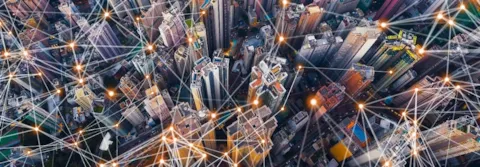Smart metering leak detection
DNV is one of the winning applicants in an award by UK Research and Innovation - a non-departmental public body sponsored by the Department for Business, Energy and Industrial Strategy (BEIS) – who have recently announced nine innovative new digital energy data projects.
The funding is being awarded through UKRI’s ‘Modernising Energy Data Applications (“MEDapps”) phase 1’ competition overseen by the Prospering from the Energy Revolution challenge. Our own project MEDapp (Modernising Energy Data application) aims to analyse the data that is already gathered by smart gas meters and use it for a series of other – primarily safety related – purposes, including:
- identifying potentially dangerous gas leaks in houses
- planned maintenance and construction activities on the gas networks
- detecting appliances that are performing inefficiently
- detecting potential problems outside the house, on the gas networks
- an enabler as the UK starts moving towards its net-zero targets by introducing hydrogen into the gas distribution system.
Our project will utilise the Open Energy data architecture being developed through projects funded under the previous MEDA competition.
Our concept
The concept of using smart gas meter data to lower the risks posed to end users arose from DNV ’s experience in gas explosion modelling in houses, and in particular from the H21 project. Our work has shown that the use of risk mitigation measures is critical to the conversion of the UK’s natural gas distribution network to carry 100% hydrogen, which is proposed as part of the UK government’s commitments to low carbon energy systems.
This project aims to determine if the use of smart meter data to provide safety and environmental benefits is possible, and how it might be achieved.
The conversion of the UK’s gas distribution network to hydrogen is critical to the gas industry, and numerous companies and organisations stand to benefit from it. Oil and gas companies realise that the use of fossil fuels has a limited lifetime, and most are planning to move to other energy sources. Conversion to hydrogen would make use of a valuable existing national asset in the distribution networks, and would safeguard many jobs as retraining from natural gas to hydrogen work is possible.
DNV is uniquely placed to help in this process as we have an in-depth knowledge of the UK systems, from our heritage as part of British Gas, but also have thousands of engineers of many disciplines, as well as test sites and laboratories, that can be used to support the transition to hydrogen.
Smarter use of available gas consumption data may facilitate the conversion of the gas network to hydrogen with obvious environmental benefits. The use of existing data and available technologies in a new use case offers consumers value for money.
Broad societal benefit
Several groups stand to benefit from the use of gas meter data for other applications, and to improve gas safety in homes:
- The occupants of dwellings with gas meters would be safer, and potentially could benefit from energy efficiency in their homes if the idea is developed further. Their direct involvement is not required for this project to succeed. In addition, the presence of a smart meter has benefits, without the proposed additional functionality, in terms of reducing household bills and potentially identifying faulty appliances.
- The gas network operators would benefit from a reduced frequency of dangerous incidents, saving them time, money, and reputational damage. However, there are also potential benefits related to routine maintenance, mains replacement and construction activities where gas customers need to be isolated while work is carried out. There is also the potential to detect gas leaks outside houses, on the distribution networks, by combining the data gathered at multiple gas meters and inferring upstream behaviour.
- The gas suppliers would benefit from the additional incentives for customers to install smart meters, and it would reduce their costs through the removal of manual meter reading and corrections to bills.
- The gas industry would benefit from the conversion from natural gas to hydrogen as it is likely that a natural gas network will cease to exist in the relatively near future. Better use of smart gas meter data would help the conversion process.
- The UK government would benefit from conversion to hydrogen as it would help to achieve their environmental aims.
- Society would benefit for the same reason.
Modernising Energy Data
Extracting value from data excites us. And deriving additional insight and enabling value creation from data about the UK energy system is something we’ve long held a passion for. We’re really pleased to see the evolution of further work to align data activities to the recommendations of the Energy Data Taskforce and implementation of that vision through programmes such as MEDA, which sees BEIS, Ofgem, and InnovateUK working collaboratively with the onshore energy industry.
The work of the IceBreakerOne community to build an Open Energy standard architecture will stimulate innovation and foster a culture of collaboration between organisations. As the importance of data increases ever more, it is reasonable to expect that key stakeholder organizations will drive further expectation around how data will be shared; sustaining activity and discussion around open and connected technologies that communicate through these agreed data standards.
We’re delighted to be part of the MEDA community and excited to see how our MEDapp will integrate into these emerging energy data landscape.
5/3/2021 10:51:42 AM
